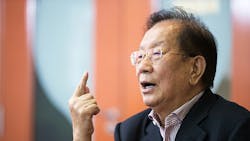How Apple Helped a Veteran CEO Recover from His Worst Error
In 2015, Yao Hsiao Tung was 75 and looking to slow down. He’d begun seeking his successor as CEO of Hi-P International Ltd., a contract manufacturer for customers including Apple Inc. and Amazon.com Inc. But an annual loss, and the $126 million claim that Hi-P filed because of it, ended that plan.
The self-professed troubleshooter attributes the company’s first red ink since listing on Singapore’s stock exchange mostly to one big error that he oversaw. Its electronics unit took on a contract to co-design and produce a dual-screen smartphone for Yota Devices Ltd. without doing enough due diligence. The Moscow-based firm didn’t take delivery of the phones, according to Yao. Yota couldn’t be reached for comment.
After two years — and, according to Hi-P, about S$100 million ($74.32 million) in losses — the company is heading for its largest annual profit on record, helped by its work for Apple. Its shares have more than tripled in 2017, which is by far the biggest gain on the FTSE Straits Times All Share Index.
“We took unnecessary risk,” Yao said in an interview in Singapore. “But I believed I could turn the situation around.”
Yao says he secured financing from lenders including Singapore’s United Overseas Bank Ltd. Then he changed the company’s structure, creating four business units in order to target a more diversified client base and be less reliant on individual customers. He increased the company’s focus on employee incentives and also developed a system to evaluate and limit exposure to counterparty risk.
Finally, he started arbitration proceedings against Yota to reclaim some of the losses. They were settled this year for $17 million and an agreement that Hi-P could sell its remaining inventory of the phone that it made for the Russian company, while keeping the proceeds.
Those efforts, coupled with Hi-P’s relationship with the thriving Apple, have led to a recovery. Yao’s company posted a S$54.5 million profit in 2016, and is expected to almost double that this year, according to estimates by DBS Group Holdings Ltd. Hi-P manufactures components of the iPhone, including the SIM card tray and volume-control buttons, the company said.
As a rare Singapore-listed company on Apple’s official list of its top 200 suppliers published in February, Hi-P has benefited from three new iPhone launches this year. Apple expects to post record revenue of as much as $87 billion in the quarter ending late December, driven by the 10-year anniversary iPhone, as well as resurgent iPad and Mac sales, the U.S. technology giant said in November.
“Hi-P is in a sweet spot now,” Ling Lee Keng, a DBS analyst, wrote in a November report. More than half of the company’s earnings are derived from the smartphone, Internet of Things and smart home businesses, which are expected to continue to do well in the next two years, she said.
Given the company’s strong earnings, Yao says he’s considering acquisitions in the automotive and health-care industries. He declined to identify targets but said he has a “big dream” and a way to achieve it.
Rags to Riches
Yao, who owns 83% of Hi-P, has seen the value of his shareholding surge to $888 million. He was born in China but moved to Taiwan when he was five, and only arrived in Singapore at 39, when he was transferred there by DuPont, his employer at the time. He started to learn English “seriously” shortly after that.
The 77-year-old says he has a fighting spirit — principled, but “very aggressive” — that was born from poverty in childhood and the relocations of his life. Everywhere you go, kids bully the newcomer, he said. “Although I was small, I became a strong fighter,” he said.
Yao left DuPont in 1983 and took over the management of Hi-P. It had been founded in 1980 with Yao as a silent partner. The company, which started out making insert molding and metal tools in China and selling them in Singapore, almost went out of business during the worldwide recession of the 1980s. It flourished thereafter, listing on the Singapore Exchange in 2003. Today, it has about 15,000 employees and a market value of more than $1 billion.
“He’s always proved the market wrong,” said Jarick Seet, head of small and mid-cap research at RHB Research Institute Singapore Pte. “When everyone thought he was going to fail, he came back.”
Still, Seet cautioned that Hi-P is too dependent on Apple. He estimates that at least half of revenue comes from the U.S. company. Hi-P has worked with Apple since 2009, starting with the iPod, according to the Singapore-listed company.
“The key thing that is profitable for them is still mobile phones,” Seet said. “They’re diversifying, but it’s still slow.”
While Hi-P’s 243% advance this year is more than 13 times that of Singapore’s Straits Times Index, it’s still cheaper than the average company in the 30-member gauge. Hi-P trades at about 12 times estimated earnings for the next 12 months, compared to 14 times for the benchmark gauge. The company’s shares fell 1.1% to close at S$1.75 ($1.30) in Singapore on Wednesday.
With the business stabilized, Yao has begun planning for succession again. He appointed Yong Inn Nam as chief operating officer in November. Yong had been responsible for developing business with clients other than Apple, in another sign of Yao’s attempts to diversify. In a statement to the exchange, Yao said that the company’s leadership for the next generation is also being identified.
“I don’t have an intention to leave the company to family,” Yao said. “I don’t have kids also. But what I want to leave is a legacy.”
By Livia Yap
About the Author
Bloomberg
Licensed content from Bloomberg, copyright 2016.
